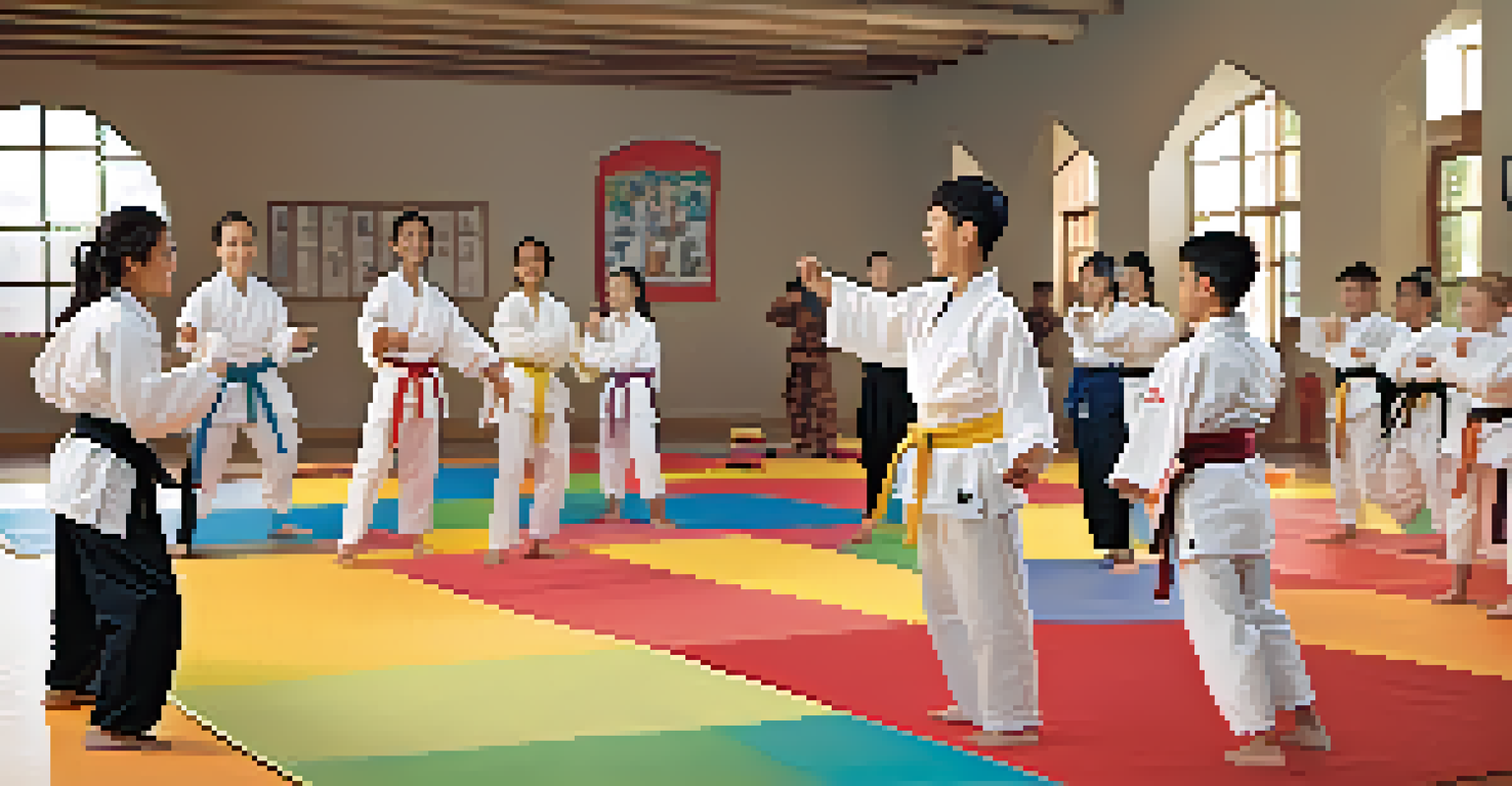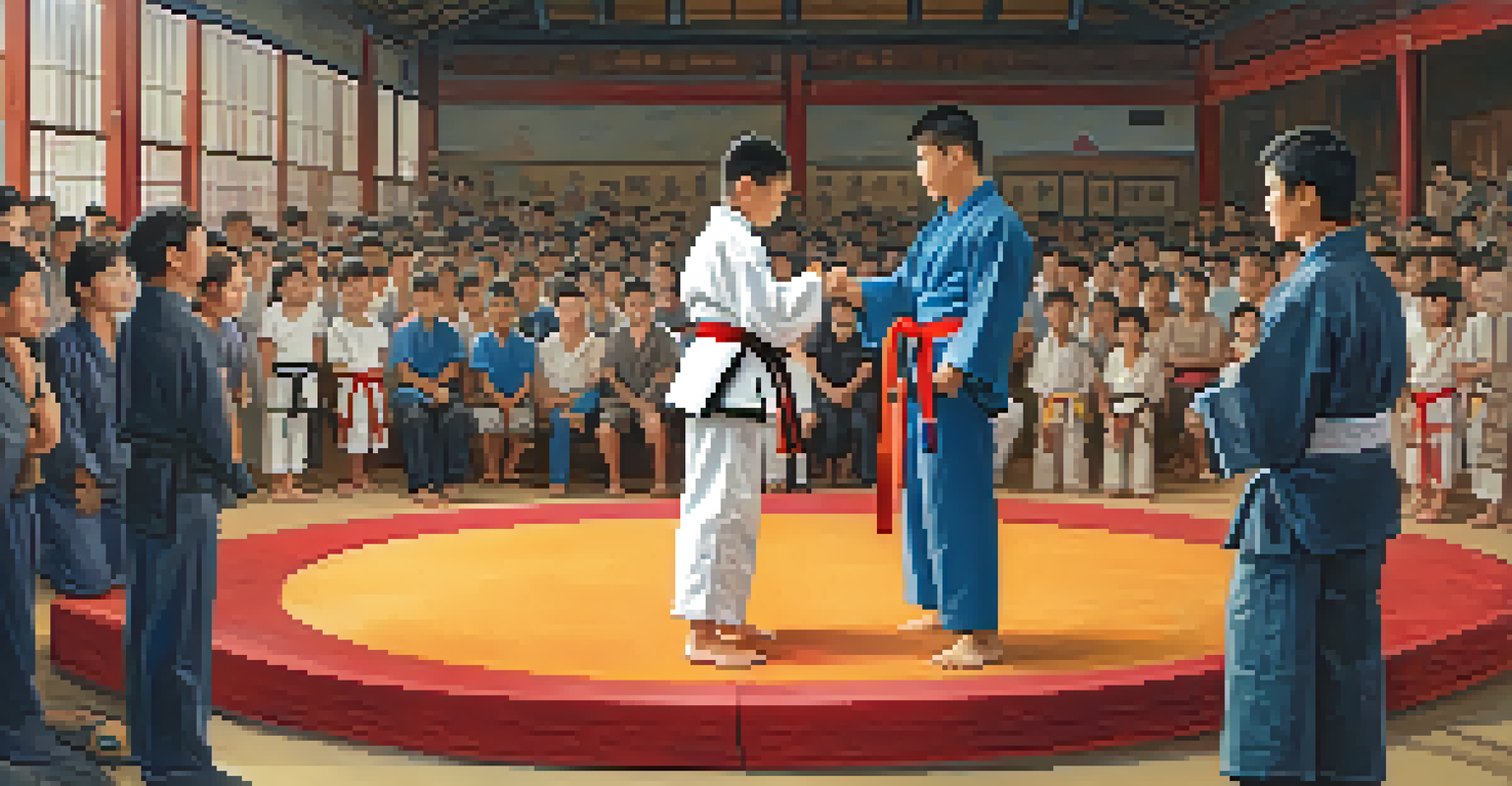Martial Arts: A Pathway to Leadership Skills in Youth

Understanding Leadership Skills in Youth Development
Leadership skills are crucial for youth as they navigate personal and social challenges. These skills include decision-making, communication, and teamwork. By fostering these attributes early on, young people can become more confident and capable individuals in various aspects of their lives.
The greatest leader is not necessarily the one who does the greatest things. He is the one that gets the people to do the greatest things.
Martial arts offer an excellent platform for developing these essential skills. The structured environment of martial arts training helps youth learn how to lead themselves and others. Through practice, they become more self-aware and understand the importance of guiding their peers.
Moreover, leadership is not just about authority; it's about influence and inspiration. Martial arts instill a sense of responsibility in young practitioners, teaching them how their actions can affect others. This understanding lays the groundwork for becoming empathetic leaders.
Building Confidence Through Martial Arts Training
One of the most significant benefits of martial arts is the boost in self-confidence it provides. Each new skill mastered and each challenge faced in training builds a sense of accomplishment. This growing confidence translates into other areas of life, such as school and social interactions.

As youth progress in their martial arts journey, they often take on leadership roles, like mentoring newer students. This experience not only reinforces their confidence but also encourages them to step out of their comfort zones. They learn that leadership often means guiding and supporting others while continuing to grow personally.
Leadership Skills Cultivated Early
Martial arts training fosters essential leadership skills such as decision-making, communication, and teamwork in young individuals.
When youth feel confident in their abilities, they’re more likely to take initiative and make decisions. This newfound assertiveness is a crucial component of effective leadership, as it empowers young individuals to voice their ideas and take action.
Discipline: The Foundation of Leadership in Martial Arts
Discipline is a core principle in martial arts and is essential for effective leadership. Students learn to follow rules, respect instructors, and adhere to training schedules. This consistent practice fosters a strong sense of self-discipline, which is vital when leading others.
Leadership is not about being in charge. It is about taking care of those in your charge.
Young martial artists quickly realize that achieving their goals requires dedication and hard work. This understanding translates to a disciplined approach in other areas, making them more reliable and accountable. Leaders who model discipline inspire those around them to develop similar traits.
Furthermore, discipline in martial arts cultivates resilience. Youth learn to cope with failure and setbacks, essential qualities for any leader. By acknowledging and overcoming challenges, they become stronger and more determined, ready to face leadership opportunities head-on.
Effective Communication: A Skill Honed in Martial Arts
Communication is a vital skill for any leader, and martial arts training provides numerous opportunities to practice it. Whether it's giving instructions in a team setting or providing feedback to peers, young practitioners learn to articulate their thoughts clearly. This skill is invaluable as they grow into leadership roles.
In martial arts, students must also learn to listen actively. Understanding verbal and non-verbal cues from instructors and peers enhances their ability to respond appropriately. This two-way communication fosters collaboration, a key trait for effective leaders.
Building Confidence Through Challenges
As youth overcome challenges in martial arts, they gain self-confidence that enhances their ability to lead and take initiative.
Additionally, martial arts often involve group activities where participants must work together to achieve a common goal. This collaboration enhances team communication skills, teaching youth how to negotiate and mediate conflicts. Such experiences prepare them for future leadership challenges in various contexts.
Cultivating Empathy and Social Skills Through Practice
Empathy is a cornerstone of effective leadership, and martial arts encourages this quality through its community-oriented environment. Practitioners often train in pairs or groups, which fosters a strong sense of camaraderie and understanding among participants. This social interaction helps youth develop compassion for others.
Through sparring sessions and teamwork exercises, young martial artists learn to appreciate different perspectives. They begin to understand that everyone has unique strengths and weaknesses, promoting a collaborative mindset. This appreciation for diversity is essential for any leader aiming to unite a team.
Moreover, the martial arts community often emphasizes respect and support for one another. This culture encourages youth to be supportive leaders, motivating their peers to reach their potential. As they cultivate these social skills, they become more effective in their interactions outside the dojo.
Setting Goals: A Key Leadership Lesson in Martial Arts
Goal setting is a fundamental aspect of martial arts training, teaching youth how to define and pursue their objectives. Each belt promotion represents a tangible goal that requires commitment and effort. This practice instills a mindset that values perseverance, a crucial trait for any leader.
As youth learn to set personal goals, they also develop the ability to inspire others to do the same. Leaders must not only pursue their ambitions but also encourage their team members to strive for their goals. By fostering a goal-oriented mindset, martial arts cultivates future leaders who can motivate and uplift others.
Empathy and Social Skills Development
The community-oriented environment of martial arts encourages youth to develop empathy and social skills, crucial for effective leadership.
Additionally, the process of working toward a goal teaches young practitioners how to handle setbacks. They learn that failures are just stepping stones to success, a perspective that is invaluable in leadership roles. This resilience ensures they remain focused and determined, even in challenging situations.
Conclusion: The Lasting Impact of Martial Arts on Leadership
In conclusion, martial arts serve as a powerful tool for developing leadership skills in youth. From building confidence and discipline to enhancing communication and empathy, the lessons learned go far beyond the dojo. These skills prepare young practitioners for success in various aspects of life.
As they progress through their martial arts journey, youth not only become skilled martial artists but also capable leaders. The experiences and values instilled in them will shape their character and influence their future interactions. It's a transformative journey that lays the foundation for lifelong leadership.

Ultimately, the impact of martial arts on youth is profound and far-reaching. By embracing these lessons, young individuals can grow into influential leaders, ready to navigate the complexities of life and inspire others along the way.